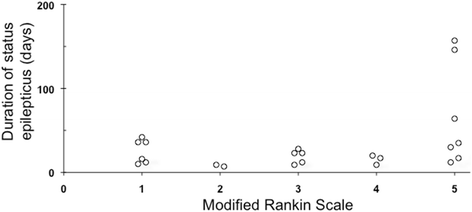Functional outcome of prolonged refractory status epilepticus
- PMID: 25925042
- PMCID: PMC4426536
- DOI: 10.1186/s13054-015-0914-9
Functional outcome of prolonged refractory status epilepticus
Abstract
Introduction: To characterize etiology, clinical course and outcomes of patients in prolonged refractory status epilepticus (PRSE) and looking for prognostic factors.
Methods: Retrospective study conducted in patients hospitalized from January 1, 2001 to December 31, 2011 in 19 polyvalent intensive care units in French university and general hospitals. Patients were adults with a generalized convulsive refractory status epilepticus that lasted more than seven days, despite treatment including an anesthetic drug and mechanical ventilation. Patients with anoxic encephalopathy were excluded. Follow-up phone call was used to determine functional outcome using modified Rankin Scale (mRS) with mRS 0-3 defining good and mRS 4-6 poor outcome.
Results: 78 patients (35 female) were included. Median age was 57 years. Causes of status epilepticus were various, mainly including prior epilepsy (14.1%), CNS infection (12.8%), and stroke (12.8%). No etiology was found in 27 (34.6%) patients. PRSE was considered controlled in only 53 (67.9%) patients after a median duration of 17 (IQR 12-26) days. The median length of ICU stay was 28 (19-48) days. Forty-one (52.5%) patients died in the ICU, 26 from multiple organ failure, 8 from care withdrawal, 2 from sudden cardiac arrest, 1 from brain death and 4 from unknown causes. PRSE was previously resolved in 20 patients who died in the ICU. At one-year follow-up, there were 12 patients with good outcome and 58 with poor outcome and 8 lost of follow-up. On multivariate analysis, only vasopressor use was a predictor of poor outcome (OR 6.54; 95%CI 1.09-39.29; p = 0.04).
Conclusion: Poor outcome was observed in about 80% of this population of PRSE. Most patients died from systemic complications linked to their ICU stay. Some patients can recover satisfactorily over time though we did not identify any robust factor of good outcome.
Figures


References
-
- Cooper AD, Britton JW, Rabinstein AA. Functional and cognitive outcome in prolonged refractory status epilepticus. Arch Neurol. 2009;66:1505–1509. - PubMed
Publication types
MeSH terms
LinkOut - more resources
Full Text Sources
Other Literature Sources
Miscellaneous

